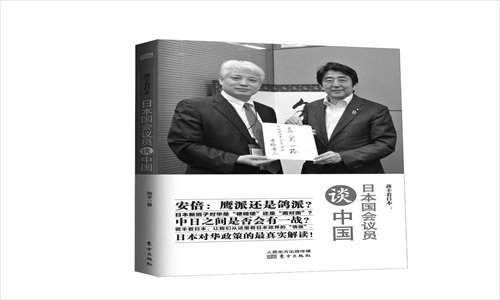Overview of attitudes toward China shows broad range among Japanese lawmakers

Political elites are small but dominant groups which can affect the political orientation of a country's development. Studying these elites' view on certain topics can help us better analyze that country's possible measures.
Jiang Feng, chief editor of Japan New-Generation Overseas Chinese Newspaper and the Japanese edition of People's Daily, shows us how political elites in Japan view China in his new book, Japanese Lawmakers' Perspectives on China, published in March by Easting Publishing Co,. Ltd.
Jiang has interviewed more than 30 lawmakers in Japan on sensitive topics such as historical issues of wars, Chinese participation in Japanese politics, visits to the Yasukuni Shrine, territorial disputes, cultural exchanges, the importance of right-wing forces and the Japanese strategy in East Asia.
Respondents cover a wide range of lawmakers, from former prime minister to ordinary members of parliament, from the Liberal Democratic Party of Japan (LDP), Democratic Party of Japan (DPJ) to other parties.
Some of them are long-time friends of China, while others do not have much understanding about China. However, they all express their respective opinions on the Sino-Japanese relationship, disputes between China and Japan, and how to promote the development of the bilateral relationship.
Jiang divided lawmaker respondents in this book into three groups according to the parties they belonged to: LDP, DPJ and other parties, and found that even lawmakers from the same party had broad differences.
For example, Shinzo Abe, who was not prime minister when interviewed, says that Japan would not compromise on the Diaoyu Islands, while former party leader Sadakazu Tanigaki believes that both China and Japan are to blame for the current fractious relationship.
Nevertheless, even some hard-line lawmakers, including Abe, admit that China is the most important neighboring country for Japan. A large number of interviewees still show goodwill toward China.
Some of them hold that Chinese capital entering Japan is no bad thing. A China which is coordinated with global development is an opportunity for Japan.
The lawmakers in Jiang's book also analyze how the relationship can be promoted from both sides against current disputes.
Satsuki Eda, former president of the House of Councilors in Japan, says that only by increasing contacts can the two countries build a good relationship.
Toshiaki Koizumi, member of the Japanese House of Representatives, suggests China and Japan should not only concentrate on conflicts. After disputes, China and Japan who share a common culture should be friendlier than before, Koshin Fujitani, who had been elected to the House of Councilors in 2007, told Jiang.
From these interviews, we can find a ray of hope in the darkness. Most countries in the world have both hawks and doves.
Since the founding of the People's Republic of China, Sino-Japanese relationship has made headway amid twists and turns. Good or bad, bilateral relations are beset with contradictions.
However, as long as the political elites in both sides keep a sober mind and have good wishes, it will maintain the momentum of development.